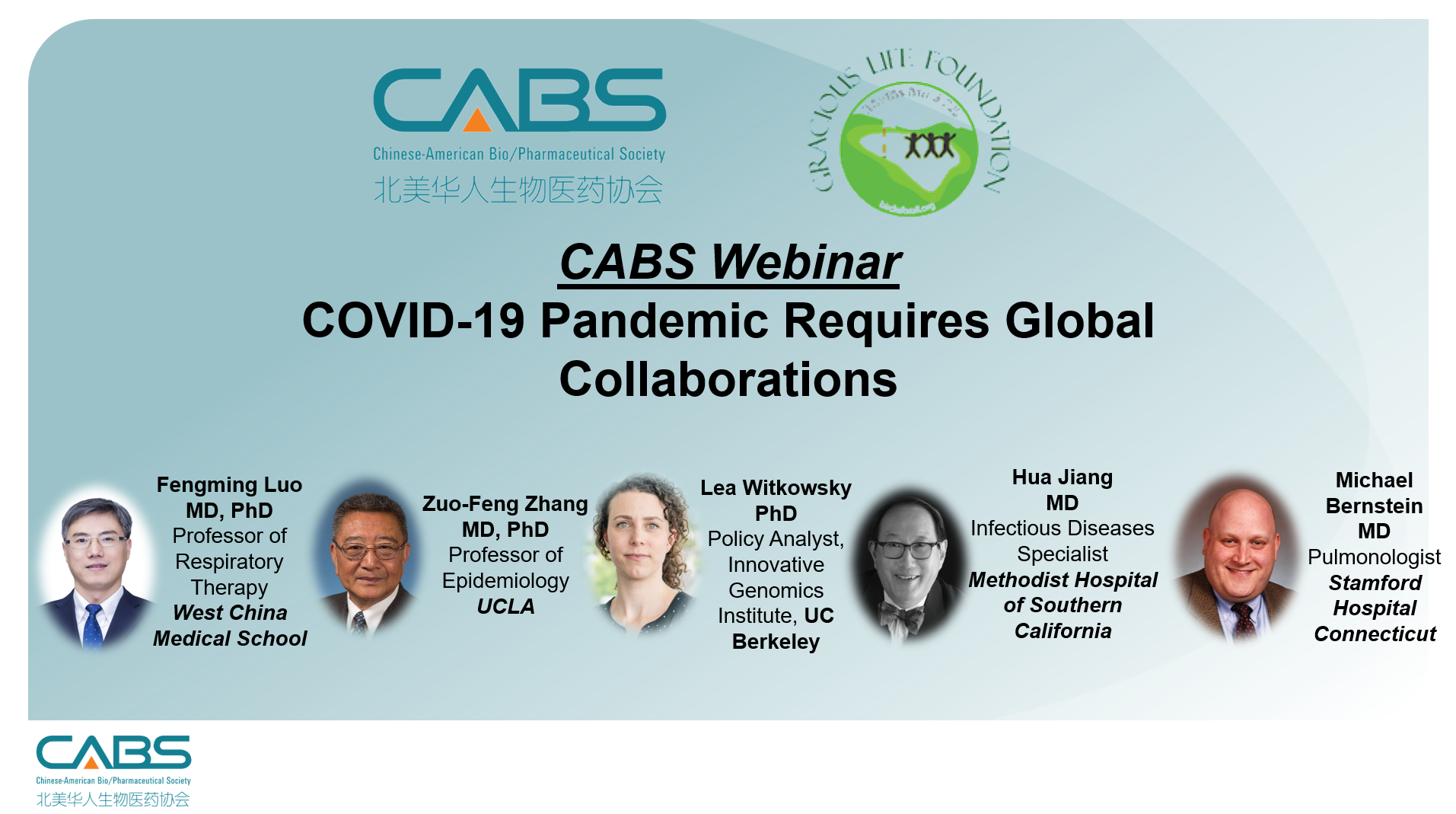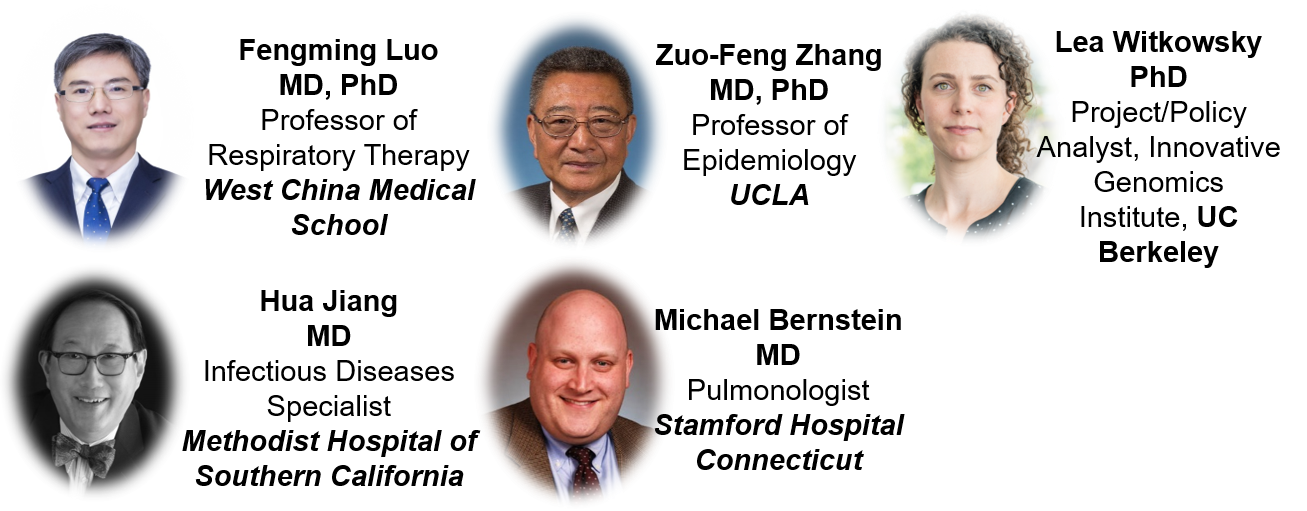Summary and Replay of CABS Webinar: COVID-19 Pandemic Requires Global Collaborations
Date: May 2, 2020 @ 5:00 pm – July 2, 2020 @ 7:00 pm
Location: Zoom Conference
is
Summary and Replay of CABS-GLF Webinar
COVID-19 Pandemic Requires Global Collaborations

Watch a Replay Recording of this Webinar

On May 2, 2020, the Chinese American Biopharmaceutical Society (CABS) successfully hosted a webinar entitled “COVID-19 Pandemic Requires Global Collaborations”. The event was co-organized by the Gracious Life Foundation (GLF). Five frontline physicians and scientists who are combating COVID-19 gave a series of mini-talks followed by a panel discussion on current COVID-19 pandemic.The webinar attracted more than 700 healthcare and life sciences professionals from around the globe, including many frontline physicians and nurses who are fighting the disease themselves (see below audience map).

Dr. Carrie Wang started the webinar with an introduction of CABS and its efforts combating COVID-19, including a series of scientific webinars and a PPE donation campaign. Dr. Weixing Chen followed with an introduction of Gracious Life Foundation.

Dr. Fengming Luo, Professor of Respiratory Therapy at West China Medical School, gave the first mini-talk on COVID-19 Challenge: Diagnosis and Treatment in Clinic Practice. Dr. Luo was the leader of the West China Medical School’s medical response team in Wuhan. He was responsible for one ICU and two wards comprising 98 hospital beds and he has treated over 300 COVID-19 patients. Dr. Luo discussed the diagnostic and treatment of COVID-19 from his Wuhan experience. The key for accurate diagnostic of COVID-19 is combining clinic history and symptoms, nucleic acid test, antibody test and imaging all together because each single method has limitations. Also, preventing the disease from worsening and providing respiratory support is very important for COVID-19 treatment. “To Comfort Always, means we should treat patients, not only with medicine, but also with psychology”, Dr. Luo concluded his talk.
Dr. Zuo-Feng Zhang, Professor of Epidemiology from UCLA, gave the second mini-talk on Epidemiology of COVID-19 Pandemic and Potential Global Collaboration. Dr. Zhang gave a brief history of COVID-19 epidemiology from Wuhan to the rest of the world. He observed that Asian countries showed a lower mortalityper million population than other countries. The underlying reasons for this finding still need to be elucidated. “A better understanding of the COVID-19 epidemiology and control of COVID-19 pandemic require global collaboration”, Dr. Zhang concluded his talk.
Dr. Michael Bernstein, a Pulmonary/Critical Care Physician from Stamford Hospital Connecticut gave the third mini-talk on COVID-19: Lessons from ICU Expansions. Dr. Bernstein discussed six challenges in expanding ICU to cover COVID-19 patients in Stamford hospital. These include physical location of ICU, medical staff, non-medical staff, equipment/proning, medications, and reporting/communications. “The most critical part and also the biggest challenge is to build a medical team that can work together efficiently during the pandemic situation”, Dr. Bernstein concluded his talk.
Dr. Lea Witkowsky, a Policy Analyst from UC Berkeley, gave the last mini-talk talk on How to Setup a Pop-up SARS-CoV-2 Diagnostic Testing Facility at a University without a Medical School in Just Three Weeks? Dr. Witkowsky presented a few key steps to convert an academic lab to a certified COVID-19 testing lab, including regulation compliance, personnel to run the test, scaling up the test, RT-PCR primers and probes, sample preparation, and the target testing population. For example, they came up with their own design of sample collection tubes prefilled with DNA/RNA shield solution to inactivate the virus before delivering the sample to the testing lab. “It is an amazing team effort to come up with a certified testing lab within a month”, Dr. Lea Witkowsky said, “thanks to all the collaborators and volunteers”.

After the mini-talks, Dr. Hua Jiang, an Infectious Disease Specialist from Methodist Hospital of Southern California, moderated a panel discussion with all four speakers. Various questions on the diagnostics, treatment and epidemiology of COVID-19 were discussed.
The event lasted two hours and forty minutes and there were still close to 290 members in the audience at the end, showing the great interest generated by the discussion. The webinar concluded with a video showing the donation activity from both CABS and GLF to various US hospitals. More than 100 audiences stayed until the end of the video.
We would like to thank Dr. Fengming Luo, Dr. Zuo-Feng Zhang, Dr. Michael Bernstein, Dr. Lea Witkowsky and Dr. Hua Jiang for their time and efforts for this webinar. We also want to thank Jenen Tan, Guanghui Han, Xu Chen, Carrie Wang, Weixing Chen for organizing the logistics of the event and thanks to Zoom and Beijing Well-being Foundation for providing technology support for this webinar. To learn more about CABS’ effort in the COVID-19 response, please visit our website www.cabsweb.org.
Fengming Luo, MD, PhD
Dr. Fengming Luo is currently the Professor and Dean of Department of Respiratory Therapy, West China Medical School, Sichuan University. He is also the Vice Director, Department of Respiratory and Critical Care Medicine at West China Hospital. Dr. Fengming Luo has been the team lead of medical response team in Wuhan and responsible for 1 ICU and 2 Wards with 98 hospital beds and treated over 300 COVID-19 patients.Dr. Fengming Luo obtained his MD from Chengdu University of Traditional Chinese Medicine, Chengdu, China, MS degree in Medicine from Fujian University of Traditional Chinese Medicine and PhD in Medicine from West China Medical Center, Sichuan University, Chengdu. From 2007 to 2008, he was a Visiting scholar in the Lab of Pulmonary Biolog at Cincinnati Children’s Hospital Medical Center, OH, US.
Zuo-Feng Zhang, MD, PhD
Dr. Zuo-Feng Zhang is a Senior Professor of Epidemiology and Medicine and Associate Dean for Research of the UCLA Fielding School of Public Health. He is also Co-Director of the UCLA AlperCenter for Environment Genomics, and Director of Cancer Molecular Epidemiology Training Program. Dr. Zhang had been a Fellow of the American College of Epidemiology (ACE) and Member of the Board of Directors of the American College of Epidemiology. He was a World Health Organization (WHO) Consultant for National Non-communicable Disease Prevention and Controls in China. He studied preventive medicine and epidemiology in Shanghai Medical University from 1978 to 1987
Hua Jiang, MD
Dr. Hua Jiang is a board-certified Infectious Diseases specialist at the Methodist Hospital of Southern California in Arcadia and Emanate Health (formerly Citrus Valley Medical Center) in Covina, California. A native of Shanghai, he graduated from Shanghai First Medical College (currently Shanghai Medical School, FudanUniversity) in 1983, as one of the top ten graduates in a class of more than 350 students. After graduation, he went on to specialize in Infectious Diseases in Hua Shan Hospital, a premier hospital in China, especially known for its Infectious Diseases program. In 1986, Dr. Jiang came to Harvard Medical School to work at the WHO Collaborative Research Laboratory for Bacterial Resistance Surveillance as a research scholar, studying mechanisms of bacterial resistance to antibiotics. He is current the Chair of Infection Control, Methodist Hospital of Southern California.
Michael Bernstein, MD
Dr. Bernstein is a Co-Clinical Director for the Lung Cancer Screening and Lung Nodule Program at Stamford Hospital with training at Duke University and Mount Sinai Medical Center in New York City. He is also an Assistant Clinical Professor of Medicine in Stamford for Columbia University College of Physicians and Surgeons. Dr. Bernstein has a particular interest and board-certification in interventional pulmonology, a subspecialty within pulmonary medicine focused on bronchoscopy, lung cancer, pleural diseases and other procedures for the lung. Dr. Bernstein is the Associate Director for Pulmonary and Critical Care at Stamford Hospital. A pulmonologist who treats severe Covid patients in Connecticut, where is badly hit by this Covid as part of areas near New York.
Lea Witkowsky, PhD
Dr. Lea Witkowsky is a Policy Analyst at the Innovative Genomics Institute (IGI), a non-profit research partnership between UC Berkeley and UC San Francisco, dedicated to improving and applying genome engineering to solve major world problems. Lea received her PhD from UC Berkeley in 2016, where she studied mechanisms of gene regulation and CRISPR-based gene editing in human cells. She joined the IGI in 2017 to work on engagement, science policy, and social impacts, but has recently pivoted to focus on the IGI’s COVID-19 response. In just three weeks a team at IGI transitioned an academic research lab at a university without a medical center into a CLIA-certified, SARS-CoV-2 clinical diagnostic facility. Lea co-led the effort to document the process in a detailed blueprint for other universities to follow and has led the establishment of policies for the allocation of our testing capacity. When not working on COVID-19, Lea runs an ethics and regulation working group that brings together life scientists, social scientists, lawyers, and ethicists. She aims to inspire and facilitate scientifically informed ethical discussions about genome editing through communications with regulators and policymakers and by convening international events that feature diverse perspectives.
Special Thanks to Zoom Video Communications and Beijing Well-being Foundation for technical support.
.
